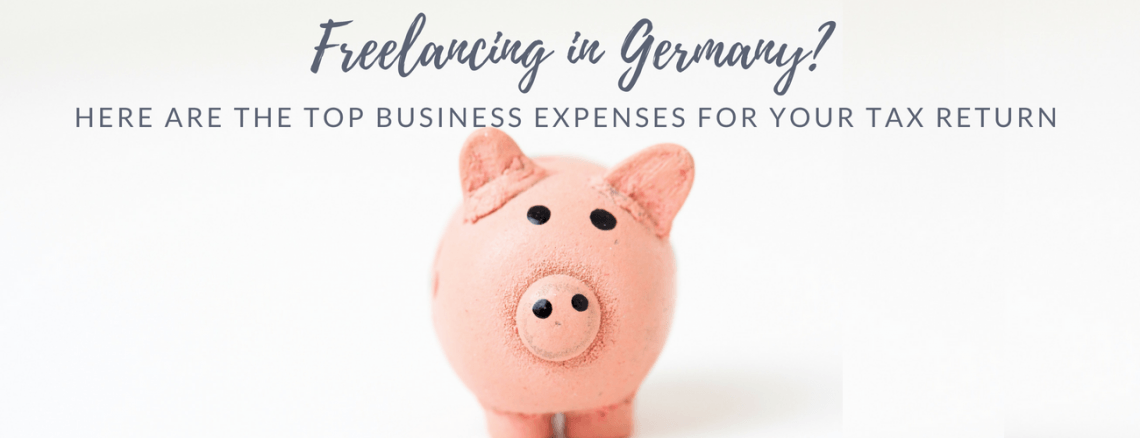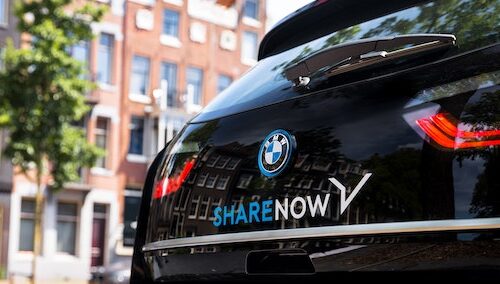
What Are The Top Business Expenses For Freelancers in Germany
Top Takeaways From This Post
Last updated on January 9th, 2023 at 05:33 pm
Are you self-employed or a freelancer in Germany and need to file your taxes soon? Learn about your top business expenses for freelancers in Germany. Plus some additional tips to save money on taxes in Germany.
Now that you know how to register yourself as a freelancer in Germany, it is time to learn about other basics of your day-to-day business – such as German tax returns.
Business-related tax deductions in Germany are one of the best ways to save money on taxes in Germany.
Tax-deductible expenses are any ordinary, necessary, and reasonable expenses that help to earn business income. Business expenses are legitimate tax deductions in Germany and are always netted against your business income.
It is important to know how tax deductions in Germany influence your profit and your tax burden. In brief, valid business expenses reduce your profit and consequently allow you to pay fewer taxes. All business, especially small businesses should track their expenses to properly capture all the deductions when filing business taxes.
Whether you file your own tax return or use the services of a tax consultant in Germany, you should save every business-related receipt so it could be used for business expenses.
Related: Beginner’s Guide to Filing German Freelancer Taxes
1) Which Business Expenses are Tax Deductions in Germany?
You can deduct all business-related costs as tax deductibles in Germany. Here are some major categories:
- Office or Home Office Costs – Read more about it in the next section
- Office Electronics – All electronic gadgets, laptops, routers, cameras, business phones etc.
- Travel Costs – If you travel to your client’s office for an onsite project
- Accommodation – Cost of hotel/ AirBnB when you are working on-site away from home
- Pension Plan Contributions
- Personal costs – Healthcare, liability and accident insurance contributions
- Business Tools – Any software including online tax filing tools or accounting software, marketing, design, editing or other software depending on your line of work
- Advertising – Online or print or other media, Google ads, social media ads etc
- Business Utilities – Mobile phone, Internet bills, other monthly subscriptions
- Business Meetings – If you decide to take your client out for coffee or dinner
- Interest payments – e.g for a business credit card etc.
- Costs related to work visa processing – Various fees, or costs of public transport tickets
- Personnel costs – Any of your full- part-time employees, or independent contractors, Fees of your Tax consultant
- Training – Includes professional training for advanced skills, refresher courses, coaching etc
- Legal costs – business liability insurance, legal protection insurance, legal consultation etc
- Service fees – Upwork service fees, Paypal fee, monthly bank account fee etc
- Other costs – Resume audit or writing service, business website development, writer for your business websites, business portraits that don’t fit in other categories.
Watch this video to see how I manage my Upwork expenses and income in bulk in a few clicks
2) Office or Home Office Costs as Business Expenses
Even if you do not go to the regular workplace, you still require a designated spot to give you that office-like feel. Maybe you rent a desk at a coworking hub or use one of the rooms in your home as an office. The good news is that you can deduct the rent and utilities that go toward the cost of the office. But there are a few conditions for using a home office as one of the tax deductions in Germany.
A room in your home is recognised as a home office only when it is
- A separate room surrounded by walls and a door: which means the workspace in the corner of your living room, does not qualify as a home office. The same goes for any workspace set up in a hallway that connects other rooms.
- Used exclusively as the home office – So you can rule out the guest room or baby room used as a makeshift office.
So before deducting your home office expenses to save money on taxes in Germany, you must make sure that it legally qualifies as a home office in the first place.
Obviously, the above conditions do not apply to commercial office spaces that you rent on a monthly or weekly basis.
Costs like rent, water, and insurance can be partially deducted (the size of the home office in proportion to the total size of the flat). The following home office expenses count towards tax deduction in Germany:
- Depreciation or rent
- Interest payments for a credit
- Repair costs
- Costs for electricity, water, heating
- Waste collection
- Property tax
- Costs for furnishing the home office
- Costs that exclusively come up for the home office e.g. renovation of a home office, are fully deductible
Related: Detailed guide to set up a home office in Germany
3) Flat-Rate Business Expenses (Betriebsausgabenpauschale)
Betriebsausgabenpauschale or flat-rate business expenses is another simple way to save money on taxes in Germany.
For some self-employed people or freelancers in Germany, it is possible to apply a flat rate for operating expenses instead of all costs incurred. Expenditure can be deducted without the need to provide proof or vouchers.
The flat rate for operating expenses applies to the following business activities for tax deductions in Germany:
- Full-time self-employed writing or journalistic work
- A scientific, artistic and literary part-time activity
- Part-time teachers
- Midwives and
- Nannies
To apply for the ‘flat-rate business expenses’ in Germany it is important to determine whether the freelancer works full-time or part-time.
In the case of full-time self-employed writers or journalists, the lump-sum deduction is 30% of the business income from this activity, but no more than 2,455 € per year.
In the case of scientific, artistic or literary part-time employment (including lecturing or part-time teaching), the flat-rate deduction amounts to 25%of the business income from this activity, but no more than 614 € per year.
As a self-employed midwife an amount of 25%, max. 1.535€, of the operating income, is deductible as operating expenses. For a self-employed nanny, 300€ per month per child who is looked after full-time (40 hours per week) can be set as business expenses.
Related: How to effortlessly do expat taxes in Germany (without hiring a tax advisor)
4) Track Business Expenses For Freelancers in Germany
A much quicker and easier way to track your business expenses is through a dedicated freelancer’s tax filing tool such as Sorted. Sorted can guide you through adding your income and expenses and automatically prepares your tax reports with that data.
The Sorted UI uses very simple English which makes it extremely helpful for expat freelancers who are uncomfortable with complicated legal or finance german terminologies.
You don’t even need an Elster certificate to file freelance taxes in Germany – Sorted sends the VAT return directly to the tax office. In addition, you can manage all your invoices and expenses in one place and have an overview of your business finances at all times.
Do you do your taxes yourself? Or did you end up hiring an accountant like me? Did I miss any business expenses for freelancers in Germany in this list? Let us know your experiences with German taxation in the comments below!






10 Comments
Olena Pererva
Yamini, sorry – I was inattentive and wrote a different name addressing you!((
Olena Pererva
Dear Emilie, thank you so much for such detailed explanation. I am happy to have found your site as I needed this overview before taking the decision to start up as a freelancer in Germany or not. Now I have a clear vision about the approach how the taxes are calculated for freelancers.
Could you please advise if the expenses that I pay for services of my business to other EU countries, to non-EU countries (e.g. ZOOM payments, facebook adverts, UK-based designers) are tax deductible or not?
I would be grateful for your response or advice to book a consultation with my local Steuerberater.
Thank you again for such great resource you have created!
Yamini
Hello Olena, every expense that is related to your business is tax-deductible. 🙂
Emilie
Hi Yamini, thanks for all your super helpful articles.
I’d like to know if it is possible for me to pass my statuatory/public health insurance (AOK) as a business expense ? I’ve read in an blog post on another site that only private insurance can be passed as an expense , but i’m not sure this is true.
Thanks in advance for your help.
Yamini
Hey Emilie,
Public or private health insurance is ALWAYS considered a personal expense. It is deductable from your net profits (the figure you get from the profit and loss statement). You can do this in your annual income tax return.
You can deduct any business-related insurances (business liability insurance, asset insurance etc) from your business expenses though.
I have a video explaining it somewhere on my youtube channel. I think this is the one: https://youtu.be/NHgjkDrNNoY
Emilie
Thanks ! Is it possible to book a Q&A session / coaching session with you ? I’m setting up as a freelancer at the moment and have 1000 questions, don’t really want to get a tax advisor would prefer talking to someone with first-hand experience like you!
Yamini
Hey Emilie, Sure, I offer 1 to 1 paid coaching sessions. If you drop an email to me at hi @ mademoisellein.de I’ll send you the details of how it works. 🙂
Jobvigo
This is really appreciated that you have presented this data over here, I love all the information shared. It will be very helpful to understand about top business expenses for freelancers in Germany. Great post to share, thanks for publishing this here!!
Pingback:
Pingback: